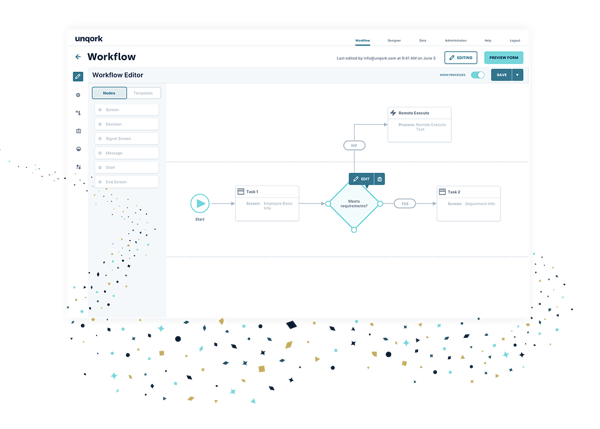Unqork raises $207 million in its C series and is now valued at $2 billion. They propose a very interesting service: the ability for you to build software without a single line of code.
What is Unqork?
Unqork is a company founded by Gary Hoberman, ex-CIO of the giant insurer MetLife. His vision was first met with doubt, as investors found him too old to carry out such an ambitious and revolutionary change. Do you even imagine what it means to be able to build software without any coding knowledge? This will shake entire industries and working methods. Investors also told him that he highly underestimated the challenge of selling such a software to larger companies.
By and large, the way companies build software is generally the same. If they do not outsource the task to a software company, they have many in-house coders that spent years coding and coding, often times working on repetitive tasks. What Unqork is doing is to create a way for non-coders to build the software their company needs. They let the user choose from a variety of pre-built components stored on a cloud-based library, which they can simply drag and drop on a visual interface. No need to learn complex languages and to spend hours in debugging – if you know, you know –, software development gets closer to drawing.
 Visual example of their interface (Source: Uncork website)
Visual example of their interface (Source: Uncork website)
The system also offers a robust security and privacy control, strong set of APIs to connect the built applications to other systems, and there is even a function to roll back to previous software and database versions in order to avoid mistakes or risk of loosing progress. It seems that the company has all the tools to meet the complexity, scale and security to satisfy the demand coming from larger companies.
Is it the end of coders?
This company is part of the “No Code Movement”, which promises to bring anyone’s idea closer to reality in a smaller amount of time. They aim to break the immense barriers of coding knowledge to digital value creation, so that almost anyone can create software in a matter of days. Can you imagine the immense change this would be to the business world where software development takes months or even years?
Does it mean that coding will become a useless skill and that hundreds of thousands will lose their job eventually? Thankfully, no. Even without code, the process does not become that simple. There is still a strong need for system architects who make sure that everything is set right and that the workflow and processes are optimized.
The goal was never to eliminate coders, but simply to free them from unnecessary, repetitive tasks, so they can focus and think on important decisional elements. Gary Hoberman even changed the title of “developer” to “engineer” to illustrate the fact that he wants employees that think critically and strategically, not machines numbed by their repetitive code-writing tasks. “I hate the word ‘developer’ because it means someone who is hired to write code as opposed to an engineer who’s hired to solve a problem,” he says. The focus should be on the solution.

Main challenges
If it is easy to seduce smaller companies which are more than happy to be able to code – or, not code, you get it – the applications they need, the challenge is to get bigger companies to do the same. Indeed, these firms often have large teams of in-house coders and external consultants who build and maintain thousands of applications essential to the company.
Another challenge is that software has become essential to get a business edge. Having a superior software that permits faster execution can often be an important weapon in a company's arsenal. This means that many companies might not be so happy to use a software built with the same parts as everyone else.
It is therefore highly likely that companies will use a mix of no-code and low-code – a sub branch which is similar to no-code but that still requires coding knowledge – making repetitive tasks at least strongly diminish while letting developers (or engineers) work on the more important issues. Jason Wong, analyst at research company Gartner, estimates that by 2023, more than half of medium and large companies will be using at least one of these so-called “no code platforms” to develop their strategic applications – that would be double the number of today, not bad.

State of things today
Today, the biggest part of Uncork's business are financial services clients. Over half of their business comes from asset management and capital markets business – thanks to their CIO, who did have some contacts in the industry. They are now also developing their Health and government segment.
Their revenues have tripled in the last 2 years and they expect no slow-down any time soon. And, most important: their clients are extremely satisfied. James McGlennon, CIO of Liberty Mutual said that Unqork has proven to be a minimum of three times faster and three times less expensive than using more traditional methods to develop and maintain applications. Michael Antoniades, COO of a medical center in Brooklyn, said that Uncork had helped them build a new, fully integrated portal of services for their clients. You understood it by now, the system lets user build very complex systems.
Recent Successes
The company recently raised $207 million in a C round making it valued at $2 billion. This last funding round was backed by BlackRock, Elridge, Fin Venture Capital, Hewlett Packard Enterprise, Schonfeld Strategic Advisors and Sunley House Capital Management. Other previous investors include CapitalG (Alphabet’s independent growth fund aka Google), Goldman Sachs, Broadridge Financial Solutions, Acquiline Technology growth and World Innovation Lab.
They plan to use this money to expand even faster, fueling their relationships with bigger service firms such as Deloitte, KPMG and Cognizant. This should help them uncork – get it? – many more opportunities. They also recently hired a CFO, and their total headcount expanded from 165 to 350 in the last year. Things are going well.

What’s next?
Gary Hoberman is growing in confidence about the project. "The same scale that cloud computing brought to infrastructure, Unqork is now bringing to all enterprise software in every industry. That places Unqork in a unique position to capture the $500 billion wasted annually on custom enterprise code and this funding will accelerate our efforts,” a statement in which their investors strongly believe.
“I look at how much money is being spent [on application development] just in financial services alone and if Unqork just gets a small portion it will be worthwhile,” says Michele Trogni, a former CIO of Swiss investment bank UBS who is now an operating partner at Eldridge. Indeed, it is estimated that large companies spend over $1.5 trillion every year to build service and custom software. Despite big efforts, many of these projects fail due to complexity. Many requite large sets of tools, very specialized skills and, let us not forget coding skills.
By taking away these complexities, Unqork might potentially revolutionize the way we build digital tools. As Robert Wolcott, journalist at Forbes said back in 2017: “Learning to code will eventually be as useful as learning ancient Greek.” Overstatement? Maybe, but we must admit there is a portion of truth in it.
Great ideas are never exploited by one single entity. The company has and will have many competitors, such as other standalone platforms like Quick Base. Other big cloud companies such as Microsoft and Salesforce are also leaning on this new business model. Let us see who will be able to grab the biggest slice of the pie.

Sources:





